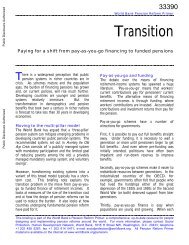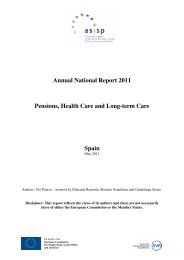Financial Sector Development in Africa: Opportunities ... - World Bank
Financial Sector Development in Africa: Opportunities ... - World Bank
Financial Sector Development in Africa: Opportunities ... - World Bank
Create successful ePaper yourself
Turn your PDF publications into a flip-book with our unique Google optimized e-Paper software.
The Potential of Pro-Market Activism for F<strong>in</strong>ance <strong>in</strong> <strong>Africa</strong>: A Political Economy Perspective 195<br />
distorted the lend<strong>in</strong>g decisions of government-owned banks so that many<br />
of them ended up lend<strong>in</strong>g to the wealthy and politically connected.<br />
Often public banks were used to make up for the losses of <strong>in</strong>efficient<br />
public enterprises; central banks also served to f<strong>in</strong>ance the state apparatus<br />
more generally (Brownbridge, Harvey, and Gockel 1998). For <strong>in</strong>stance,<br />
the Uganda Commercial <strong>Bank</strong> (UCB), which used to be the country’s<br />
largest public sector bank, failed to adequately appraise or monitor loans<br />
or to pursue their recovery because of the political nature of lend<strong>in</strong>g. The<br />
discipl<strong>in</strong>e of UCB’s borrowers was low because they often regarded such<br />
loans as rewards for political support and, <strong>in</strong> some <strong>in</strong>stances, politicians<br />
also told their constituents that loans from government banks need not<br />
be repaid (Nsereko 1995, 28–29). As a consequence, loan recovery rates<br />
for the lend<strong>in</strong>g schemes adm<strong>in</strong>istered by Ugandan public banks were<br />
below 50 percent <strong>in</strong> the 1980s, and banks mostly failed to reach their<br />
targeted clientele (Brownbridge 1998a, 129–31).<br />
Moreover, <strong>in</strong> many <strong>Africa</strong>n countries, positions <strong>in</strong> development banks<br />
were used by public authorities to reward political clients. This may<br />
expla<strong>in</strong> why the Nigeria Education <strong>Bank</strong>, a public <strong>in</strong>stitution <strong>in</strong>tended to<br />
f<strong>in</strong>ance the higher education sector, had failed to make a s<strong>in</strong>gle loan seven<br />
years after it was established, despite employ<strong>in</strong>g 261 staff <strong>in</strong> 21 offices<br />
(Alawode et al. 2000, 55). The political costs of lay<strong>in</strong>g off excess staff<br />
were a key obstacle to the privatization of government banks as part of<br />
the f<strong>in</strong>ancial reform process.<br />
Private banks <strong>in</strong> <strong>Africa</strong> also failed to serve the real economy <strong>in</strong> a way<br />
that <strong>in</strong>creased broad-based private <strong>in</strong>vestment and <strong>in</strong>stead provided<br />
f<strong>in</strong>ancial resources ma<strong>in</strong>ly to the government and a small economic elite.<br />
Us<strong>in</strong>g political pressure, politicians and politically connected private<br />
<strong>in</strong>vestors <strong>in</strong> some countries appear to have been able to access loans from<br />
private banks at below-market rates, to fail to repay them, and to resist<br />
repayment successfully when banks took action to recover the loans.<br />
Moreover, <strong>Africa</strong>n governments, chronically <strong>in</strong> fiscal crisis, used not only<br />
direct measures such as lend<strong>in</strong>g requirements to public enterprises but<br />
also <strong>in</strong>direct measures such as <strong>in</strong>terest rate controls or high reserve<br />
requirements to govern private banks so as to f<strong>in</strong>ance the state apparatus<br />
(Brownbridge, Harvey, and Gockel 1998; Daumont, Le Galle, and Leroux<br />
2004).<br />
At the same time, private banks, <strong>in</strong> pr<strong>in</strong>ciple opposed to such government<br />
<strong>in</strong>terference <strong>in</strong> the bank<strong>in</strong>g sector, often came to a profitable modus<br />
vivendi with the government. In many <strong>Africa</strong>n countries, such as<br />
Botswana, Kenya, and Ghana, private banks did not have to compete with







